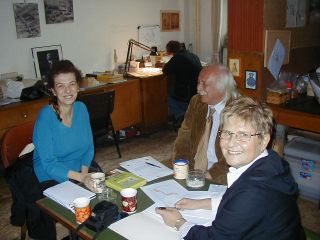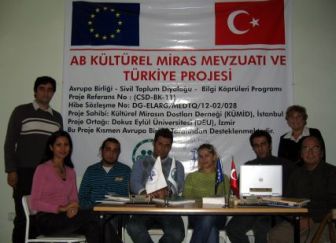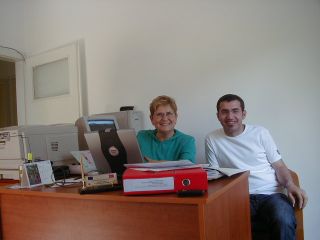EUROPEAN UNION CULTURAL HERITAGE LEGISLATION AND TURKEY PROJECT
SUMMARY

| 1.Programme: | Civil Society Dialogue: Bridges of Knowledge Programme |
| 2.Budget Office: | B7-4100 (MEDA) |
| 3.Contract No: | DG ELARG/MEDTQ/12-02-028 |
| 4. Contracting Authority | Central Finance and Contracts Unit(CFCU) Ankara, (http://www.cfcu.gov.tr) |
| 5.Executing Authority: | Secretariat General For EU Affaires (SGEA), Ankara, (http://www.abgs.gov.tr) |
| 6.Date of the Contract: | 27 December 2006 |
| 7.Duration of the Project: | 1 year |
| 8.Total Budget: | EUR 33.788 (%10 was covered by KUMID) |
| 9.Applicant of the Project: | Friends of Cultural Heritage (FOCUH), İstanbul |
| 10.Partner of the Project: | Dokuz Eylül Üniversity (DEU), İzmir, Turkey |
11. General Objectives of the Project:
- To translate all EU legislations on “Culture” and other international legislation on ”Culture-Cultural Heritage–Conservation” published by UNESCO, COE, ICOMOS, ICOM..etc considered in EU acquis communitaire from English into Turkish
- To present them to the target groups
- To make some suggestions regarding compliance
12. Aims of the Project:
12.1.In the context of European Union Membership period of Turkey
- To contribute to the adoption process by translating into Turkish the “Culture” chapter of acquis communitaire which constitutes a complex and continuous mission both before and after the EU membership of Turkey,
- To provide support to studies toward eliminating information difference and increasing awareness of the people and institutions on the said communitaire,
- Within the participation period, during the period related to adopting and implementing of communitaire, to make contributions to the acceleration of analytic ability, capacity and academic knowledge of the students and professors from Dokuz Eylül University in “Culture” sector,
- To make contributions to the sustainable pool of EU expertise-knowledge-ability by adding one drop established jointly by a university (DEU) and a Turkish Civil Society Association (FOCUH), needed before and after the membership,
- To establish a sustainable English-Turkish common term pool about resource collection- translation method- culture- conservation of cultural heritage, that to be used in translations of other EU legislation.
12.2. In the context of culture-cultural heritage –conservation
History of land of Turkey that is at the beginning of EU membership negotiations, has almost the same history with civilization. Wealth and diversity of cultural heritage of Turkey cannot be defined by history of numbers. Of course this cultural wealth and assets both belong to Turkey and humanity. With the membership of Turkey, this great cultural wealth will be taken into the borders of EU. And these values only can be transferred to the next generation by implementing a true conservation concept.
True conservation concepts, international approaches and criterions take place in the legislations published by international-intergovernmental institutons such as EU, UNESCO, COE or non governmental organisations such as ICOMOS, ICOM, ICA…etc. that are evaluated as a part of EU acquis communitaire and EU Legislation “Culture” legislation to which Turkey is a party.
By bringing these legislations into Turkish some of which are considered as domestic law, it is aimed
- To offer an important Turkish resource to the target groups who don’t know English but have mission, decisions and education on conservation of cultural heritage of our country,
- To create awareness on international criterions, approaches needed to be considered about conservation of cultural heritage among target groups ,
- To present the Turkish source in order to work towards models that would concur with the quantity, scale and condition of our cultural remains, without overlooking their outstanding significance and that would not fall behind the internationally accepted standards in their basic approaches.
13. Target Groups of the Project:
Target groups are the people who don’t know English but have mission, decisions and education on conservation of cultural heritage of our country
14. Main Activities of the Project:
Activity 1: To form the project staff – To Introduce the Project to the Project Staff
Activity 2: To Search for the International Legislations
Activity 3: To Determine the Terminology for the Translation
Activity 4: To Organize the Training Program on “Terminology”“ and “Orientation “ for the Project Staff
Activity 5: To Translate the Legislations and To Control Them
Activity 6: To Prepare the Expert Report titled “Cultural Heritage and Conservation within Turkish Education System in the Light of International Legislation: General Review and Proposals"
Activity 7: To Deliver the Project Outputs – To Complete the Project
15. Concrete Outputs of the Project
15.1. Book entitled “AB Kültürel Miras Mevzuatı ve Türkiye Projesi” “(EU Cultural Heritage Legislation and Turkey Project)” printed in 2 Volumes and 1000 copies (approximately 800 pages) including all EU legislations on “Culture” and a big part of the other legislatons of UNESCO, COE, ICOMOS, ICOM..etc. translated into Turkish from Engilish
15.2. Friendly user Web Page including all EU legislations on “Culture” and all other legislatons of UNESCO, COE, ICOMOS, ICOM..etc. translated into Turkish From Engilish (http://www.kumid.eu )
15.3. Expert Report titled “Cultural Heritage and Conservation within Turkish Education System in the Light of International Legislation: General Review and Proposals"(Approximately 10 Pages)
15.4. “English-Turkish Term Pool” on culture-cultural heritage-conservation prepared with the aim of “establishing a common terminology” about these subjects. (Approximately 200 words )
16. Sustainability of the Project:
When the Project is completed, as of 24 September 2007, in all EU legislations “Culture” published on http://www.europa.eu.int/eur-lex/lex/en/repert/1640 and all other legislatons of UNESCO, COE, ICOMOS, ICOM..etc. published on their web pages will have been already translated into Turkish. FOCUH and DEU will make a decision as to continue the cooperation established in this Project. Thus, after the completion of the Project all new legislations published by the said institutions since 25 September 2007 will be translated and published on the web page of FOCUH.
“EUROPEAN UNION CULTURAL HERITAGE LEGISLATION AND TURKEY PROJECT”
BRIEF INFORMATON ON THE PARTIES OF THE PROJECT
Project Applicant: Friends of Cultural Heritage (FOCUH) İstanbul
(http://www.kumid.eu)
 Friends of Cultural Heritage (FOCUH) was formed as a voluntary, non-profit and non-governmental Association on December 6, 2005 in Istanbul, Turkey in order to protect cultural heritage all over the world, both in times of peace and in times of hazard such as natural disasters, armed conflicts.. etc., to properly transfer the said heritage to future generations; to establish good relationships and provide necessary cooperation and support to inter-governmental, public, military, non-governmental, private and civilian organizations, institutions, experts and individuals working in Turkey and abroad on the protection of cultural heritage. FOCUH with its 28 members, is also the Instutional Member of EUROPA NOSTRA, the Netherlands.
Friends of Cultural Heritage (FOCUH) was formed as a voluntary, non-profit and non-governmental Association on December 6, 2005 in Istanbul, Turkey in order to protect cultural heritage all over the world, both in times of peace and in times of hazard such as natural disasters, armed conflicts.. etc., to properly transfer the said heritage to future generations; to establish good relationships and provide necessary cooperation and support to inter-governmental, public, military, non-governmental, private and civilian organizations, institutions, experts and individuals working in Turkey and abroad on the protection of cultural heritage. FOCUH with its 28 members, is also the Instutional Member of EUROPA NOSTRA, the Netherlands.
FOCUH have the chair as the Scientic Member in Scientic Committee of the International Congress on “Archeology and Computer held in Vienna, Austria in 2006 and 2007.
In 2006-2007/2007-2008, FOCUH was/is one of the Partners of two projects on “Innovation in Cultural Heritage Interpretation-ICHI- Project of ARCH NETWORK (Scotland) organised within the scope of European Union Education and Youth Programme/Leonardo Da Vinci Programme/Mobility.
In the late 2007, FOCUH became one of the Project Partners of Graduate School “Human Development in Landscapes" coordinated by “Institut für Ur- und Frühgeschichte Christian-Albrechts-Universität, Germany.
During the membership process of Turkey to EU, FOCUH was invited to and participated in the informative meetings regularly organized by the Secretary General for EU Affaires ABGS in Ankara-Turkey in order to be informed on the national NGOs concerning the Screening Meetings on the Chapters (2006) &9 .
During the preparation of the Turkey’s Negotiating Position Document on Chapters “Education and Culture”, opinions and contributions of FOCUH requested by Secretary General for the EU Affairs (ABGS) were prepared and presented in the report. (2006)
Project Partner: Dokuz Eylül University (DEU) İzmir
(http://www.deu.edu.tr)
Dokuz Eylul University was founded in Izmir on 20 July 1982, with the aim of contributing to social development via providing our country with the brain power it has trained and will train in its educational institutions on a wide range of disciplines from medicine to economics, from arts to engineering.
Seventeen previously founded institutions of Ege University and other various higher education institutes were affiliated to the University in the same year. Number of its academic units reached 41 by 1992. Presently DEU owns 10 faculties, 5 schools, 5 vocational schools, 5 graduate schools and 5 institutes.
Reasons of the Cooperation with DEU as “Project Partner” in the Project:
 Proje başvurusunda da belirtildiği gibi DEU Proje ortağıAs it was mentioned in the Project Proposal , one of the reasons of cooperation with DEU as “Project Partner”in the Project. Cooperation with a successful university as the partner of the project is preferred because of the high possibility of the results of the researches and publications to be used in the scientific researches and publications and applications and in addition to this, because the project concerns mostly undergraduates and other universities.
Proje başvurusunda da belirtildiği gibi DEU Proje ortağıAs it was mentioned in the Project Proposal , one of the reasons of cooperation with DEU as “Project Partner”in the Project. Cooperation with a successful university as the partner of the project is preferred because of the high possibility of the results of the researches and publications to be used in the scientific researches and publications and applications and in addition to this, because the project concerns mostly undergraduates and other universities.
Apart from this, as a result of the ACTIVE EDUCATION SYSTEM applied at DEU, the presence of high quality students is the second reason for cooperation with this university as the project partner. Active Education is a student-centered system of education. The basis of the system is made up of the applications of “problem based education”. The aim of the problem-based education is to direct the student to see the problem, discuss and solve it, and to encourage the searching – questioning mentality rather than give the information readily. This model causes the formation of a qualified, questioning and searching student profile. This student profile is thought to contribute a lot to the successful implementations and completion of the project.
